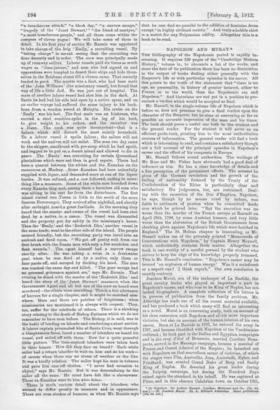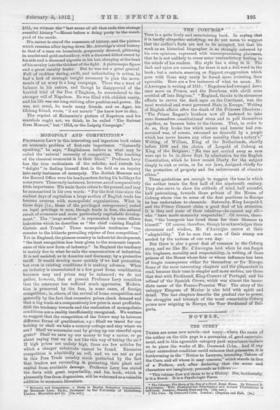NAPOLEON AND MURAT.*
Tirs bibliography of the Napoleonic period is rapidly creasing. It requires 120 pages of the " Cambridge Modern History," volume ix., to chronicle a list of the works, and since the date of its publication there has been no diminution in the output of books dealing either generally with the Emperor's life or with particular episodes in his career. AD
this points to the truth of the statement that " there is ma age, no personality, in history of greater interest, either to. France or to the world, than the Napoleonic era and Napoleon." And historians are not yet in a position to pro- nounce a verdict which would be accepted as final.
Mr. Hassall, in the single-volume life of Napoleon which is. before us, does not presume to give a final verdict upon the character of the Emperor, but he aims at conveying as far as. possible an accurate impression of the man and his times. The book should prove a useful one both to the student and the general reader. For the student it will serve as am efficient guide-hook, pointing him to the most authoritative sources of information. The general reader will find a book which is interesting to read, and contains a satisfactory though not a full account of the principal episodes in Napoleon's career and the effect of his conquests in Europe.
Mr. Hassall follows sound authorities. The writings of Mr. Rose and Mr. Fisher have obviously had a good deal of influence on him. He has a clear knowledge of details and a fine perception of the permanent effects. The account her gives of the German revolution and the growth of the feeling of nationality fostered by the Treaty of the Confederation of the Rhine is particularly clear and satisfactory. His judgments, too, are restrained. Deal- ing with the execution of the Duo d'Enghieu, Napoleon, he says, though by no means cruel by nature, was liable to outbursts of passion when he committed deeds. over which he grieved later. " But the execution was no. worse than the murder of the French envoys at Rastadt on April 28th, 1799, by some Austrian hussars, and very little worse than the abstension of the British Government from checking plots against Napoleon's life which were hatched in England." The St. Helena chapter is interesting, as Mr. Hassall makes use of the privately printed "Memoranda of Conversations with Napoleon," by Captain Henry Meynell, which undoubtedly contains fresh matter, Altogether the book is one worthy of a careful perusal by the student who. strives to keep the edge of his knowledge properly trimmed. This is Mr. Hassall's conclusion: " Napoleon's career may be termed 'an explosion of human energy.' Was it a maleficent or a superb one ? I think superb." Our own conclusion is exactly contrary.
Joachitia Murat, son of the innkeeper of La Bastide, the great cavalry leader who played so important a part in Napoleon's career, and who rose to be King of Naples, has not lacked biographers. A complete collection of 'his letters is. in process of publication from the family archives. Mr.. Atteridge has made use of all the recent material available, and has produced a book which many will find as interesting as a novel. Murat is an interesting study, both on account of his close connexion with Napoleon and all his more important victories, but also on account of the human interest of his own career. Born at La Bastido in 1767, he entered the army in 1787, and became identified with Napoleon at the VendAmiaire outbreak ; he took part in the Italian and Egyptian campaigns. and in the coup cr6tat of Brumaire, married Caroline Bona- parte, served in the Marengo campaign, became a marshal of France and Grand Admiral of the Empire; .he launched out with Napoleon on that marvellous career of victories, of whicn the stages were Ulm, Austerlitz, Jena, Aueratadt, Eylau, and Friedland; was created Grand Duke of Berg and finally King of Naples. Ho deserted his great leader during the Leipzig campaign, but during the Hundred Days. raised again the standard in his behalf. He was captured at. Pizzo, and in this obscure Calabria= town on October 18th,.
*y) Napoleon. B' Arthur eoliaonNethuen and Cor . l m iit e. Co. [10a. &I. net.]
1815, we witness the-" last scene of all that ends this strange eventful history "—Murat before a firing party in the court- yard of the castle.
His career is one of the romances of history, and the picture which remains after laying down Mr. Attoridge's vivid history is that of a man on horseback, gorgeously dressed, glittering in isca,rlet and gold embroidery, with a diamond-hilted sword by his side and a diamond aigrette in his hat, charging at the head of his cavalry into the thickest of the fight. A. picturesque figure and a great cavalry leader. But he was not a great general. Full of reckless daring, swift, and unhesitating in action, he had a lack of strategic insight necessary to plan the move- ments of an army in a long campaign. There was a want of balance in his nature, and though be disapproved of the hurried trial of the Duo d'Enghien, he surrendered to the stronger will of Napoleon.. He was filled with childish vanity, and his life was one long striving after position and power. He was no cruel, he made many friends, and as Agar, his lifelong friend, wrote, " it sut mourir " (he knew how to die).
,The reprint of Meissonier's picture of Napoleon and his marshals ought not, we think, to be called " The Retreat from Moscow," but "1813, or the Leipzig Campaign."











































 Previous page
Previous page